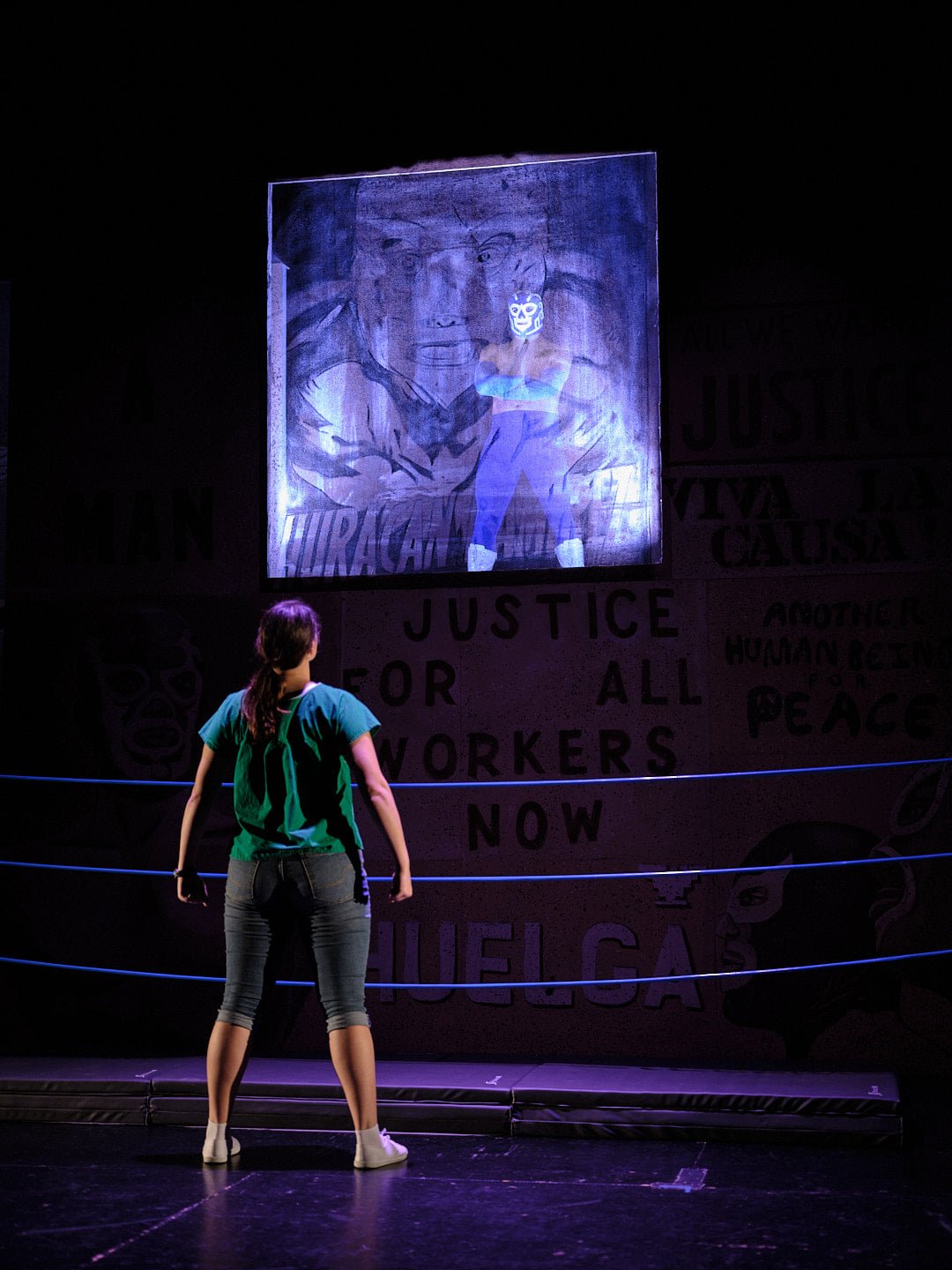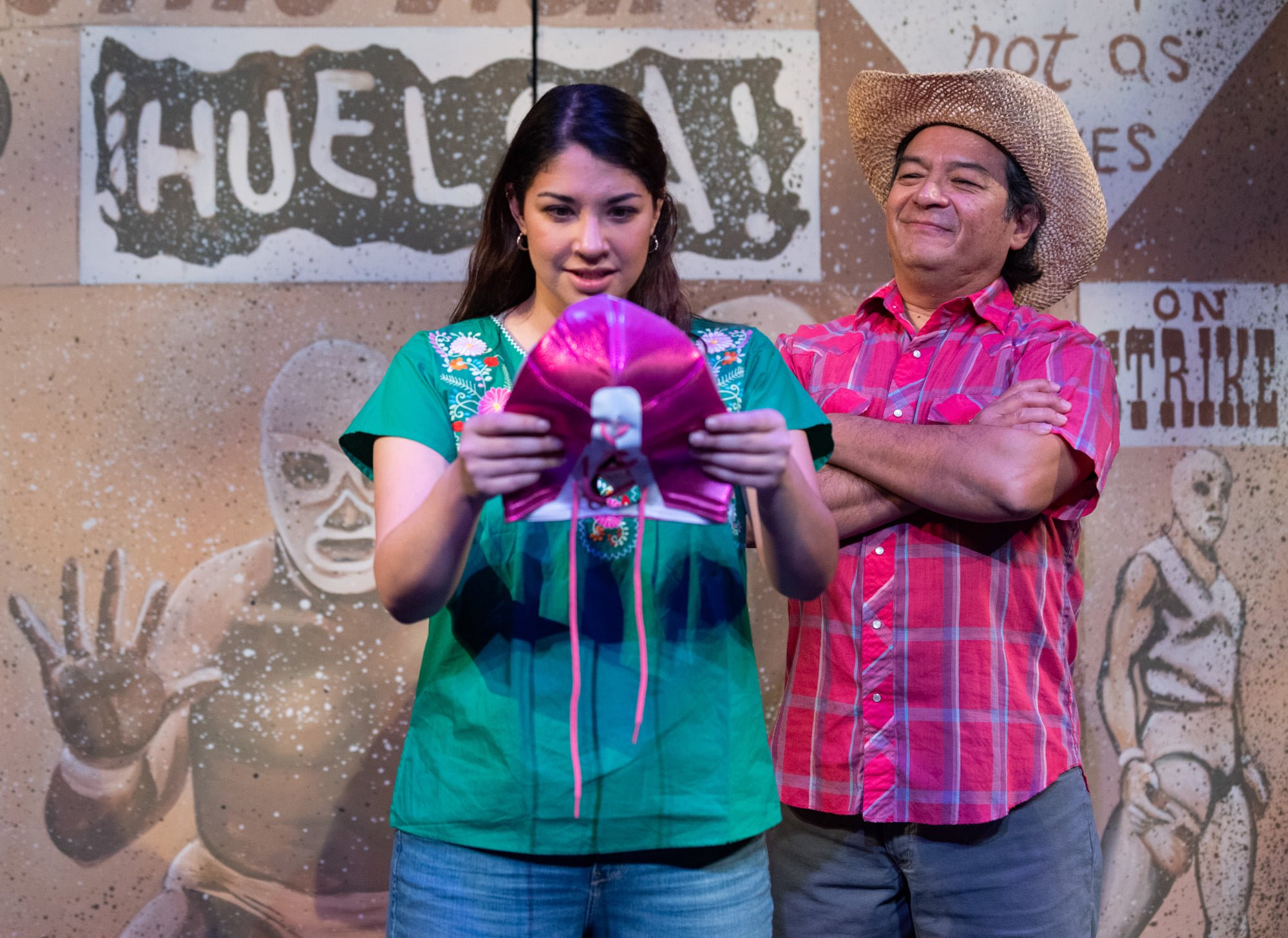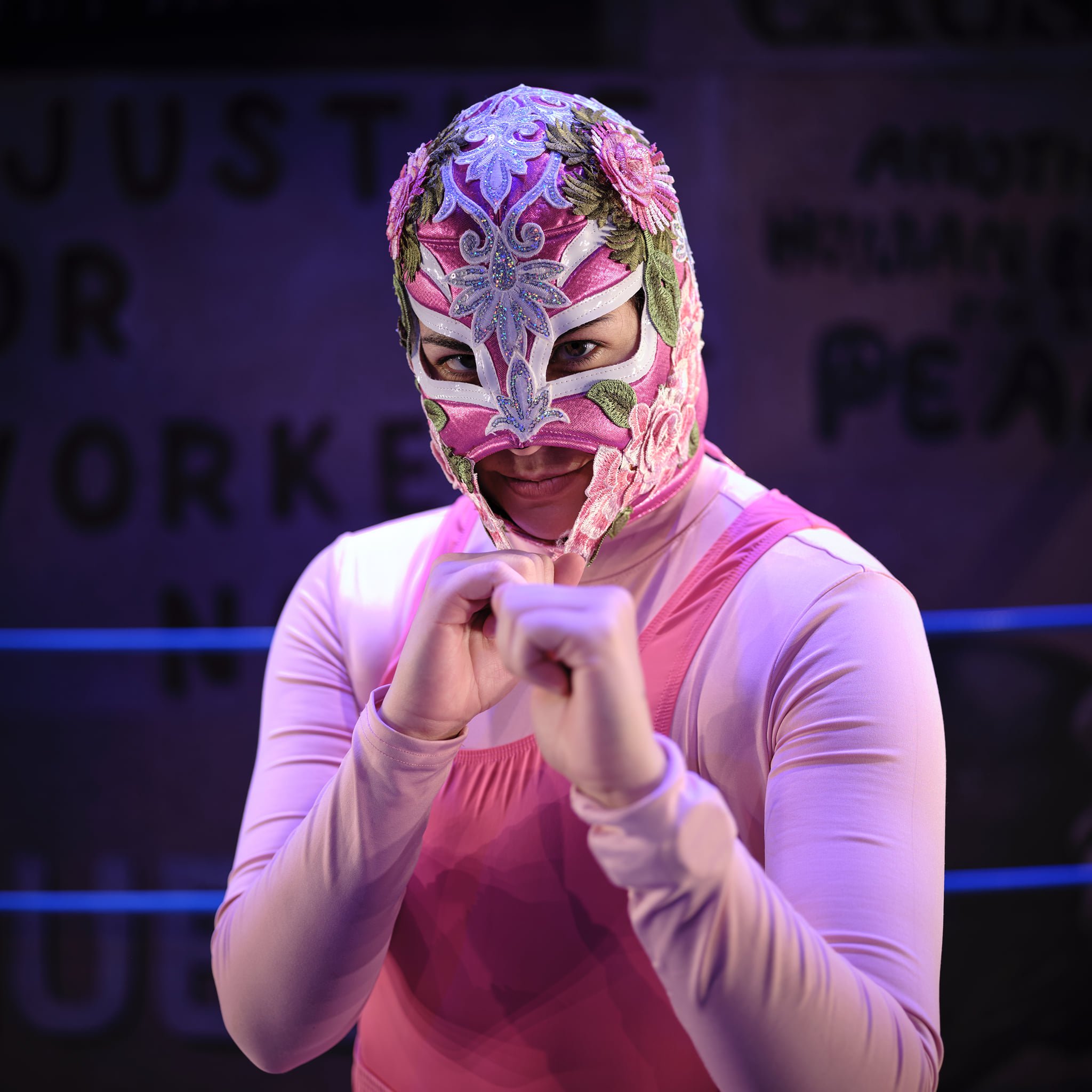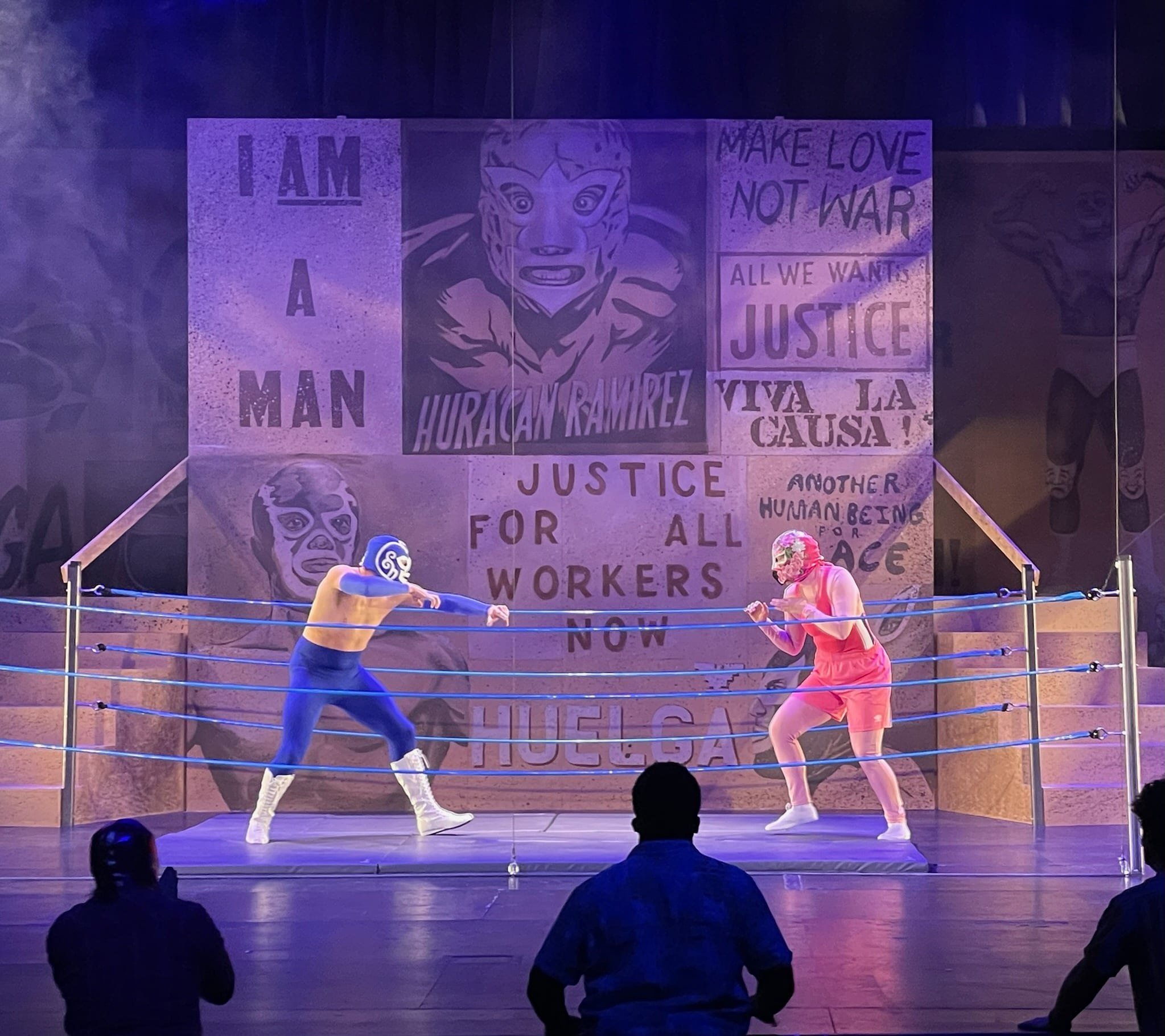Luchadora! @ Cara Mia Theatre Company
—Teresa Marrero
*In an earlier version of this review, Sylvia Armendáriz (Nana Lupita) was incorrectly credited as Sylvia Almendáriz; we regret the error and have corrected the actor’s name.
The word luchadora is the feminine Spanish version of the more common masculine version luchador, and both popularly refer to a wrestler. I say “popularly” here, because later I will circle back to other connotations of the word. Wrestling in both the Spanish-speaking and other cultures is coded in its masculinity. Or is it? More contemporary cultures have made way for female wrestlers and boxers. However, it was not always so.
Playwright Alvaro Saar Ríos sets his coming of age play Luchadora! (a Dallas premiere for Cara Mia Theatre Company) in two timelines: in the grandmother’s (Nana/Old Lupita, played by Sylvia Armendáriz) 1968 era, and in Nana’s unspecified present, as she tells granddaughter Vanessa (Leonela Arguello) the story behind the belongings inside a special small suitcase. The playwright moves the story seamlessly between the two timelines, generating just the level of tension to keep us engaged all along the way.
Co-directors Gloria Vivica Benavides and Christopher Llewyn Ramirez do the story justice, and draw fine performances from the multiracial cast. Adding to the high quality are the fabulous and functional scenic design by Tara A. Houston, the composition and sound design by Armando Monsiváis, Lori Honeycutt’s lighting design (it works well to illuminate transitions and key moments), the lively costume design by Ryan Matthieu Smith, and the wrestling choreography by Aski “The Mayan Warrior.” All elements work synergistically to create an entertaining and highly polished experience for audiences of all ages. The theater was full of children and their families at the Saturday afternoon performance I attended.
In the later timeline, grandmother Lupita tells her granddaughter Vanessa the full story behind the legendary wrestling match of Máscara Rosa vs El Hijo, set in the 1960s. The story is brought to life onstage by young Lupita (Tatiana Lucia Gantt), her father Mr. Guerrero (welcome back to Dallas, Rodney Garza!), and Lupita’s best friends, Leo (Tyler “T” Lang) and his sister Liesl (Jori Jackson). Why did Máscara Rosa disappear at the height of his wrestling career? Who inherited his mask and defended his name against El Hijo (Osmar Martinez)?
This is a story whose primary message is that girls can do anything boys can do, and should be allowed to dream big and wide to their heart’s content. Traditional gender-coded dress and restrictions impinge upon all the female characters in some way, and all of them strive and struggle to make a different place for themselves in the world.
Young Lupita must earn her father’s respect in order to wear his Máscara Rosa. Nana Lupita still defies traditions as a lifelong luchadora. The Mask Maker (Miramora Rocha) decides to train girls as luchadoras, since men will not. Vanessa shuns dance class to take up boxing gloves in the ring. Liesl wants to fix trucks when she grows up. Several characters, including Hannah (J Davis-Jones), Liesl, and Leo’s older sister (ACTOR?) go to Vietnam—and not all return.
The unfolding story is told on one side of the stage. At upstage center, designer Houston provides an elevated space behind a gauzy screen to highlight the drama of El Hijo’s defiant challenge, and of Hannah’s fate. Of course, there is a large wrestling ring center stage. Behind the ring in large lettering are political slogans from the 1960s. It’s a visually pleasing and organic set that lends itself beautifully to the story, and to the movement of the actors. Wrestling choreographer Aski “The Mayan Warrior” takes full advantage of the space offered.
Intertwined is the story of the father, Mr. Guerrero, played with by his usual warmth by Garza. He tells his story of life as a migrant farm worker—and how wresting offered cash rewards that financially helped his family, but at the cost of his physical health.
It is also the story of three kids growing up in the small Texas town of Santa Teresa and their migration up north to Milwaukee, Wisconsin. Young Lupita and her brother-sister best friends are believable in their roles, and bring a freshness and vigor to their performances. They are a lot of fun to watch, and clearly the many children in the audience liked them too.
This is a participatory experience as we, the audience, freely cheered for our favorite luchadora, laughed at some silliness, joined the girls and women in cheering for their heartfelt pursuits and grieved over the sadness of Hannah’s story.
Rocha’s Mask Maker deserves recognition for a vibrant performance, as does Armendáriz for her warm interpretation of Nana/Older Lupita and Leonela Arguello as the curious young Vanessa. And keeping in line with honoring the performance of all actors, no matter the size of their role: Bismark Quintanilla played Ring Announcer/Yellow Luchador; Taylor Mercado Owen played Boy #1/Newspaper Boy #1; Dayan A. Rodriguez performed as Boy #2/Newspaper Boy #2; Tomas V Moquete was Boy #3/Newspaper Boy #3/ Green Luchador. All brought high energy and brightness to the play.
Cara Mía’s executive artistic director David Lozano obviously extends a hand and opens doors for Dallas area Latinx, African-American, and Anglo theater professionals to polish their craft in the technically fully-equipped theater space of the Latino Cultural Center .
Winding back to the beginning of this review, the word luchador/a has multiple resonances. La lucha was a name given by the United Farm Workers to their struggle for fair pay during the 1960’s grape pickers’ strike, led by Dolores Huerta and César Chávez. La lucha also refers to the everyday struggles that people of color and other underrepresented peoples must contend with as a daily struggle to prosper in racist societies. La lucha, then, also means to struggle, but most importantly, to overcome those struggles—a great message for girls and women, who are highlighted in this coming of age story that is still so relevant today.
One hopes Luchadora! will return someday soon for a longer run.
WHEN: Closed February 13
WEB: caramiatheatre.org



